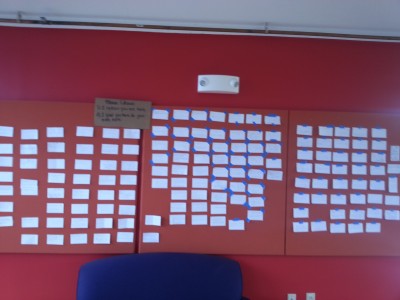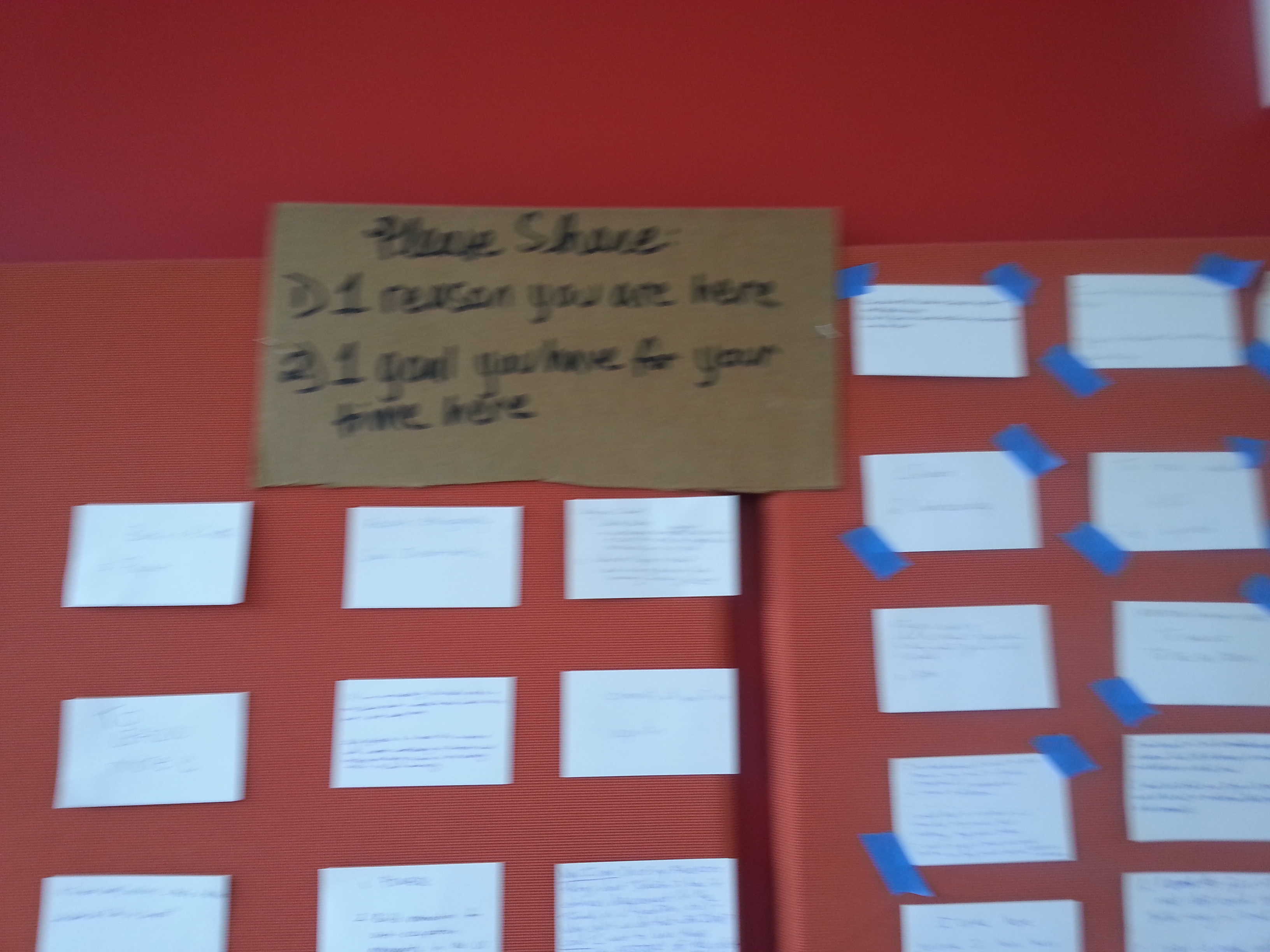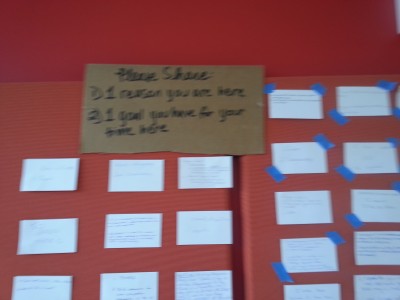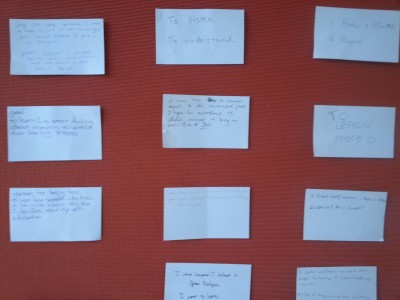On Monday, the final day of what Previous New Voices Rebbe David A.M. Wilensky calls “Liberal Jewish Comicon,” my first interaction was with Ali Kreigsman, who was attending in support of her and Jana Kozlowski’s upcoming documentary, Between the Lines, about Jewish day school students who come to university and discover that in spite of all the Israel education they received, there are many things they weren’t taught about Israel. The problem the documentary addresses is one that she knows from experience and I know many others know as well, so hopefully it will help to wake people up to the fact that if we don’t teach our students some of the harder facts about Israel, others will.
Ali was actually one of at least three documentary filmmakers in attendance. Apparently, a bunch of Jews not believing what many people think or just assume Jews are supposed to believe makes a good story. If reason won’t work, hopefully the fact that this issue of the need for more nuanced Israel education in mainstream Jewish institutions is now getting so much negative attention will force them to finally do something about it.
PLENARY
Monday’s plenary, “From Mississippi to Jerusalem: A Discussion with Jewish Civil Rights Veterans” featured Dorothy Zellner, Ira Grupper, and Larry Rubin, three volunteers for the SNCC heavily involved in Freedom Summer in the 1960’s, and progressive causes and labor movements all their lives.
In spite of its generally liberal attitudes, their views on Israel-Palestine have made them pariahs among much of the organized Jewish community. Yet no matter how many bad experiences they have had with synagogues, rabbis, federations, and other communal institutions (and they have all had many), they all ground their activism in their Jewishness. The students’ reaction to them was similar to how, in other contexts, some Jews react to hearing words of Torah from their most esteemed rabbis.
Though what struck and disturbed me most about the plenary, and the conference as a whole, was an almost tangential conversation about the use of violence that came up during the Q&A session, I’m saving my thoughts on that for an editorial I hope to have ready for next week. For now, I want to share some of the speakers’ most noteworthy quotes:
“We [Open Hillel] are going to win this. But before we do, it will get worse. …. And it will get worse not because we’re losing, but because we’re winning.” – Dorothy Zellner
“At first leftists didn’t criticize the USSR and supported Israel’s existence as a socialist state. Neither of these things panned out, and it taught us that supporting Israel means criticizing it when you see it doing horrible things.” – Larry Rubin
“Privilege is a relative term. It has too often been used in place of concrete work. I had the privilege of working on an assembly line and I gave it up.” – Ira Grupper
In Mississippi in the ‘60’s, the white volunteers would talk about nationalism and post-nationalism and whatever, and the black organizers would say, “We don’t care what it looks like in the end, we just want our civil rights.” Palestinians have similar reactions to Jews talking about one- or two- or parallel-state solutions. – Paraphrase of Larry Rubin
“Who are we speaking for? Watch out! Who are we speaking to? Watch out!” – Dorothy Zellner
At the close of the plenary, an Open Hillel representative announced a new initiative of theirs to have students bring these three activists to Hillels across the country whether the Hillels want them or not.
MY FAVORITE GAME TO PLAY AT THE CONFERENCE
Scarf or keffiyeh?
CLOSING SESSION
In the closing session, three key Open Hillel organizers shared their perspectives on what was and what will be for the movement. First to speak was Emily Unger, who graduated Harvard about a year ago, with a brief history of Open Hillel.
It started with a conversation in a Harvard dining hall in 2012, she said. The Progressive Jewish Alliance wanted to host an event [a speech by former Speaker of the Knesset Avraham Berg] with the Palestine Solidarity Committee, and was told they could host it at Hillel. Then they got an email saying they actually couldn’t, because Hillel International and the Combined Jewish Philanthropies of Boston, Harvard Hillel’s biggest donor, said they could not host it, and if they did, they would lose funding. The students fought back by starting a Facebook page, tabling, starting a petition, staying up all night to write op-eds…anything they could do to convince the establishment that this was wrong. “It turns out we [young Jews] are not disengaged and disillusioned. We care a lot. We reached out and got involved and now we’re here,” she said, then went on to point out how everything about the conference was student led.
Naomi Dann, who was instrumental in making the Hillel-affiliated Vassar Jewish Student Union Open last year and now works for JVP and served as the Conference’s media liaison, spoke next. Largely echoing and expanding upon Unger’s themes, she highlighted the “moral imperative” to live your values, saying that through the Conference, “We’ve shown we can embrace the tension and work with it towards a common goal, to commit to something bigger than our political disagreements.”
The voice echoing in everyone’s ears as they left was that of Amelia Dornbush of Swarthmore, who spoke with Emma Goldman-like fervor about how Hillel doesn’t belong to its employees or to its Board of Directors, but to its students, which is why they need to bring dissenting opinions into the building even if they have to force themselves through the doors.
And thus ended the conference about the importance of constructive dialogue.
“I only heard passion,” said Harvard Hillel’s Rabbi Getzel Davis after the closing session, which had more hard words for Hillel than any I had heard previously. “I heard a lot of passion for Judaism and for community.”
HARVARD HILLEL’S PRESENCE
Rabbi Davis, who describes his role as mentoring the progressive Jews on campus, was there along with Harvard Hillel’s Executive director, Rabbi Jonah Steinberg. Both were there representing only themselves. When I approached Rabbi Steinberg for comment, he sent me Harvard Hillel’s official statement on the conference, which highlighted:
- As an organization committed to “connection and dialogue with Israel,” it cannot partner with organizations supporting BDS, as it “urges severing all ties with Israel, including intellectual and academic interaction.” Thus, regarding the Avraham Berg affair, it said the reason Hillel could not co-sponsor it was solely because it will not partner with the Palestine Solidarity Committee, which endorses BDS.
- Harvard Hillel has invited many speakers from all parts of the spectrum, including Breaking the Silence and Palestinians, and has not nor would ever ban or silence any student based on their political beliefs.
Separate from the official statement, he added that, “Much of what took place at the Conference could easily have happened at Harvard Hillel with no resistance whatsoever.” This is an important point, as something like “Right now this amazing conversation couldn’t take place in a Hillel” was a not-infrequent refrain throughout the Conference.
ON NUMBERS AND DIVERSITY

Many (including myself) have also noted that the conference was only diverse on one end of the spectrum. I have since learned that representatives from many right-wing organizations were invited, but all declined. While it might be understandable politically why they would decline to attend an event where strong leftist rhetoric is the default, I emphasize again that the organized Jewish community will not be able to ignore this movement for much longer and must start formulating constructive ways to respond.
Derek M. Kwait graduated from the University of Pittsburgh and is editor in chief of New Voices.



